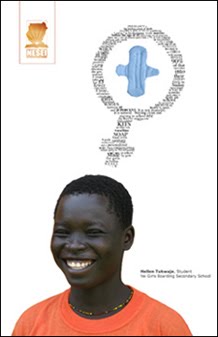


Pic 1: Students are taught how to be active participants in and proponents of democracy. This civic education of young people is crucial to sustainable democratic change.
Pic 2: South Sudan is a place where weapons have been the currency for more than 20 years. That hasn't stopped these girls from expressing their zest for life.
Pic 3: "When you mine beneath the surface of fear, you discover resiliency, determination, and hope." -Anita From guns to chalk, land mines to books....
While standing in line waiting to check my luggage for a short in-county flight, a man in front of me was obviously carrying something very bulky. I was curious about it.
“What’s in your vest pockets,” I ask.
“Nothing,” he said, “except bullets.”
Nodding my head as if this is normal, I simply replied, “Oh.”
Two weeks earlier, while preparing to leave a public building, my friends and I were stopped before reaching the parking lot. Why? It seems some unhappy former employees had barricaded the front gate and were armed with knives and spears. No one was getting in. No one was getting out.
Oh. Blink.
Believe it or not, sometimes it is easy to forget that NESEI is at work in a post-conflict country. As we focus on educating young women in secondary schools, it is routine to place our attention on their grades, attendance, relationships, and general academic progress. But once we leave campus, anything goes.
Here is an example of an unpredictable day. It was a travel day. We were flying from Bahr El Ghazal back to Equatoria and then driving on to Yei. Our intention was to leave directly from the Juba airport for the return drive. The maximum amount of time we planned to stay at the airport? 30 minutes. Just long enough to collect our luggage.
For reasons that Colin attempted to explain (something about shock absorbers, a suspension crack, and a tire rim) we were forced to spend the afternoon waiting, and waiting, for the truck to be fixed. Around 5:00 p.m., we were given a “yellow-light.” I don’t say “green-light” because nothing related to transport in Sudan is ever that simple – or fast. The truck was in decent enough shape to “probably” make the 5 hour drive between Juba and Yei. However, there was just a snippet of daylight left. That was a problem.
We had to consider the potential consequences of being on a dirt road, in the dark, in Sudan. Thought had to be given to landmines, rogue rebels, and if our mobile phones would get service if we were caught in an emergency situation. Really. Think about this the next time you back out of your driveway in suburbia.
We opted for “safety first.” Staying overnight in Juba was a better plan than hitting the road. We would be contributing to the local economy, and getting a good night’s sleep before the trek to Yei.
It’s not necessarily wise to tell these things. It gives my sisters more cause for worry than I already provide them by being so far away from home. But I tell it because it’s a part of the NESEI story. And even more so, it’s a part of life in a developing world. You have heard it before. Maybe even ignored it before.
But, these situations remind me of how much our students have overcome. Our transport delay was minor. The man with the bullets was supposed to have them – he is a soldier protecting civilians. The guards could have found a better way to protest their unemployment, but in a place where weapons have been the currency for more than 20 years, it is not reasonable to think that things can change overnight.
Our NESEI girls have lived in this environment for a long time. It’s home. It’s where they will likely raise their daughters and sons. When you mine beneath the surface of fear, you discover resiliency, determination, and hope. You may even find security and safety in the collective power of individuals who stop and think before they act. Our girls have done this. They have reasoned that an education will give them a better future. They do not fear it.
As we approach the national elections in 2010 and the referendum for self-determination in 2011, we are likely to experience anxiety. Old feuds linger and democracy sometimes seems elusive. Yet, in recent years, I have witnessed progress in security and seen steps taken for improved communication among the country's people. I want to believe that Sudan can have free and fair elections.
If our girls can overcome adversity, then we can too. Together, we can fight a different kind of war. One where chalk replaces guns and where textbooks replace landmines. This is important to keep in mind when boarding a plane with a man carrying little, “except bullets.”
- Anita








